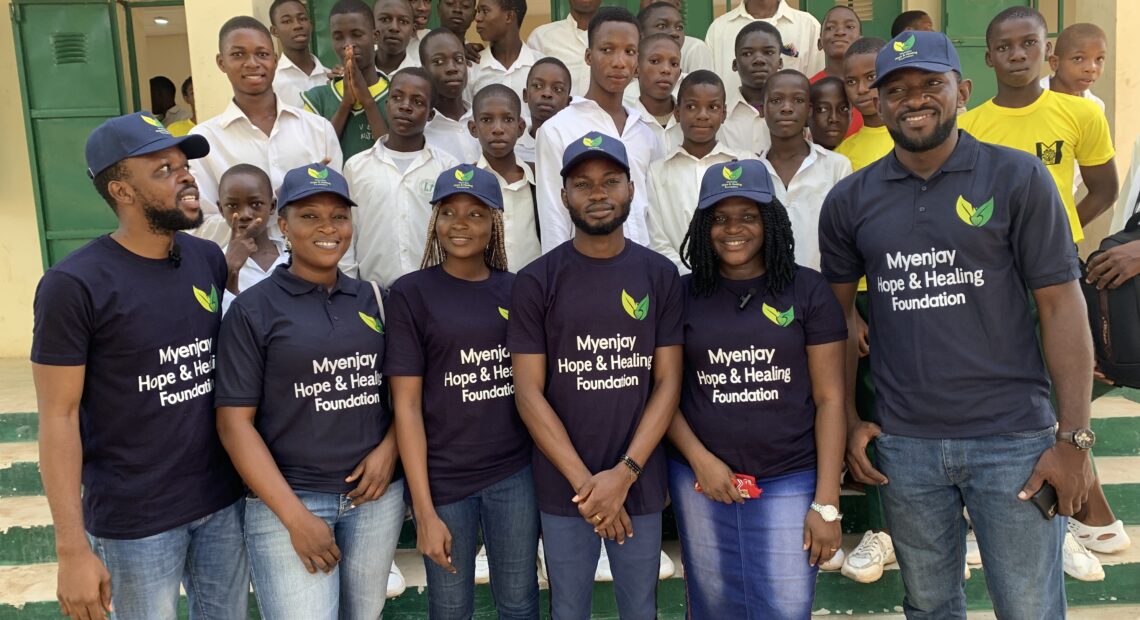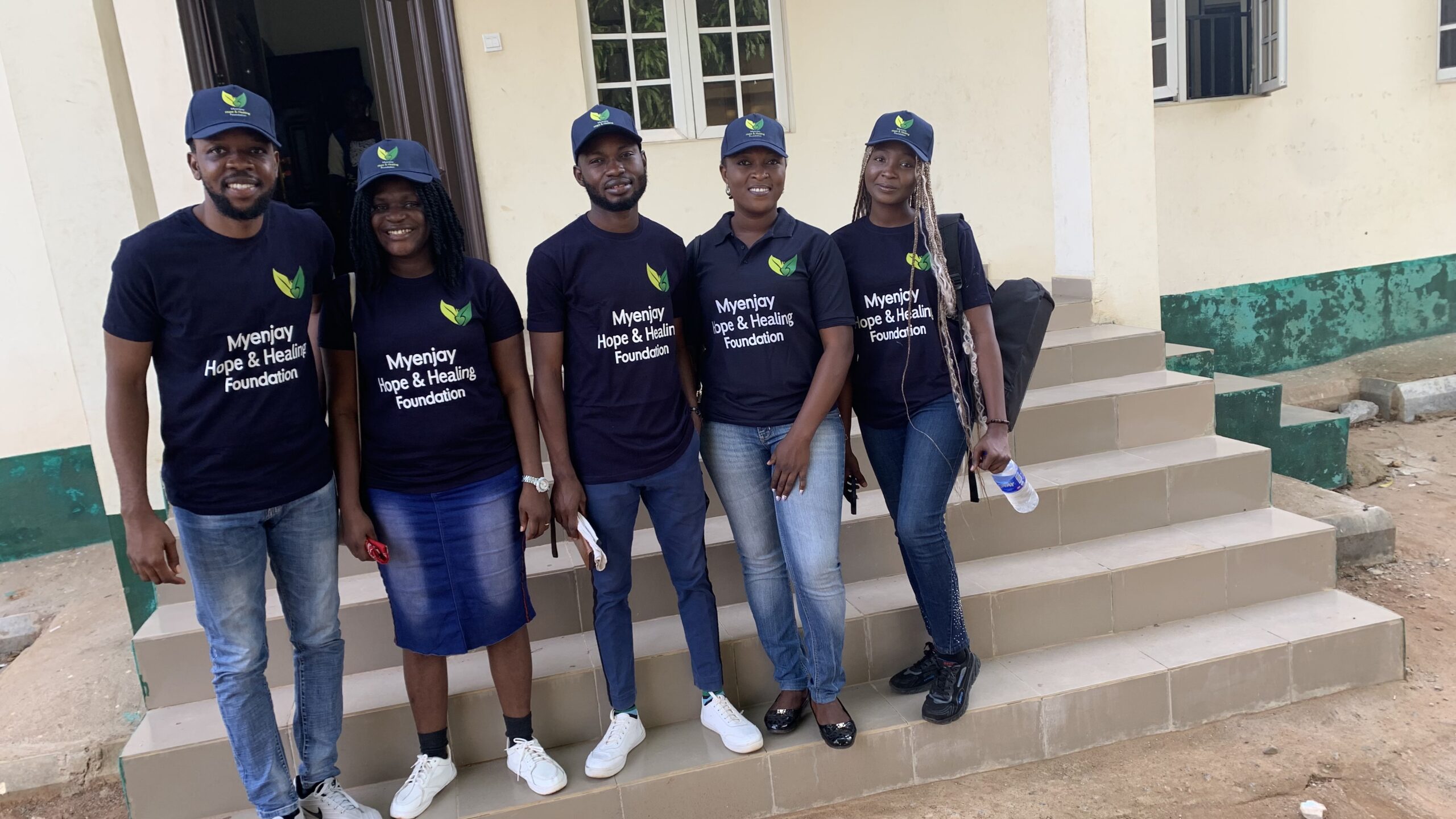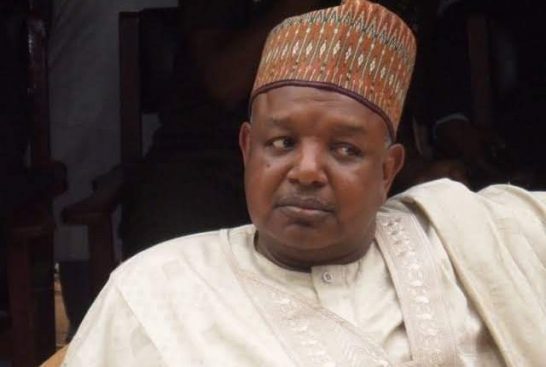Here’s effort that is helping students of Mass Education overcome Substance Abuse

By Daniel Adaji
Students of the Federal Capital Territory (FCT)’s Department of Mass Education in Kuje, Abuja have begun to share testimonies about the life of transformation they now enjoy, sequel to an intervention on abuse of substances hitherto common among them.
The students, whose past was infested with drug abuse, stated that the intervention was timely as they were less informed about the path to freedom from drug abuse.
According to the World Health Organisation (WHO),- Substance abuse refers to the harmful or hazardous use of psychoactive substances, which include alcohol and illicit drugs.
It is now a major public health challenge worldwide, leading to risky sexual behaviour, personality disorders, gender-based violence, criminal tendencies, and a host of others.

Some officials of the foundation
The harmful use of alcohol alone globally has been estimated to result in 3.3 million deaths each year and at least 15.3 million persons globally have been reported to be suffering from drug use disorders.
In 2008, 155 to 250 million people all over the world were estimated to have used psychoactive substances with cannabis being the most commonly abused substance.
WHO estimated that 0.7 per cent of the global burden of disease in 2004 was due to cocaine and opioid use, with the social cost of illicit substance use being in the region of 2 percent of Gross Domestic Product (GDP) in those countries which have measured it.
More than 2.6 million youths between age 10 to 24 die each year globally. The causes of these deaths are most times preventable and due to abuse of drugs.
In fact, not less than 14 per cent of adolescent girls and 18 per cent of boys aged 13–15 years in low- and middle-income countries are reported to have been drinking alcoholic drinks.
In 2008, 155 to 250 million people all over the world were estimated to have used psychoactive substances
WHO reports that this problem is more prevalent in the West Pacific regions as more than 50 per cent of girls aged 10–19 and more than 80 per cent of boys aged 10–19 had at one time consumed alcohol.
Nigeria is not spared as studies have shown that about two-third of in-school adolescents in Osun State Nigeria used substances in both rural (65.7%) and urban areas (66.0%) respectively
Many factors have been identified to be responsible for drug abuse among young people, these include: experimental curiosity, peer pressure, poor socio-economic condition at homes and the need for extra energy for daily activities among others.
In its measure to check the social menace, MYENJAY Hope and Healing foundation, a Non-Governmental Organisation based in Abuja, as part of its humanitarian service, carries out mental health awareness and sensitisation against substance abuse among students in the FCT Department of Mass Education, situated in Kuje Area Council, Abuja.
According to a senior management staff of the school, Rev. Andrew Haruna, who could not speak extensively because he was not authorised, said before the intervention they had several cases of drug abuse by the students.
“We have had several incidents of substance abuse by the students in this school. Sometimes, we observe their demeanour; for instance, when interacting with the students, some of them respond to us so rashly in simple conversations that should not lead to provocation. At a time, we started conducting stop and search at the gate in order to curtail bringing incriminating items to the school. During some of those searches, we found students with marijuana, knives, and other items that may cause harm. Even as simple as sachet water that could be consumed in less than 5 seconds, if we notice a student is taking too long to drink sachet water, we question the content of that water. It was as serious as that, he said.”
The official said since the visit of the foundation to the school, the management has begun to notice good behaviour among the students and that there has been drastic reduction in the number of cases of substance abuse observed among the students.
“Since MYENJAY visited this place, other foundations and NGOs have been coming to seek opportunities to reach out to the students on mental health and substance abuse. I must say that we have observed positive changes among the students since they (MYENJAY) organised the sensitisation programme among our students, he said.”
A volunteer with the NGO Sunday Akor said it was amazing working with the foundation to impact the lives of the young ones, especially at the Department of Mass Education Kuje.

“As early as 7:30 am, we were already at Kuje from town. This shows the commitment of all the volunteers, not just myself. we had to be in the school before the assembly started. The management of the school embraced us and allowed us to use the assembly time to talk to the student. They really accepted us. From my observation I can say that the students embraced the intervention wholeheartedly. We ensured our illustrations were relatable to the students. We brought it down to their level to the extent that they understood that drug abuse is a vice that should be abstained from. We also engaged them in conversations while we were having our presentation there. I was happy to know that the students understood what we told them and they appreciated it too.
The Administrator of the school commended our work and loved that we continue what we do to touch more lives,” he said.
The Director of the Initiative, Mendos Saleh said one of the core focuses of the foundation is sensitisation against substance abuse targeted at the youths.
“We have observed the increasing use of illicit drugs by young and old in the country but particularly, the youths now consume these substances increasingly, and we saw the need to intervene in order to save them from the impending danger posed by the abuse.
“We decided to pay a visit to the FCT Department of Mass Education, Kuje and upon enquiry, we realised that some of the students there were exposed to drug abuse hence the need to create awareness and provide counselling to them.
“When we visited the FCT Department of Mass Education, we met with the students; we divided them into groups of boys and girls. For the boys, we talked about mental health in commemoration of the mental health week; we discussed anxiety and how it is connected with substance abuse. Surprisingly, most of the participants know almost all the drugs identified as illicit and they mentioned many of the drugs. One of the students asked how he could be free from drug addiction and we counselled him on steps to freedom. The principal commended our effort and encouraged our activities in the school.” he said.
Speaking on the challenges limiting the reach of their intervention, the director of the foundation said “we desire to reach out to more schools and youths in the FCT however, the bureaucratic process of approval has delayed most of the interventions we would have carried out. Also, getting capable volunteers to reach out to the students is a major constraint to the work we do,” he said.
He also called on volunteers and well-meaning individuals to support the foundation with funds and logistics to eradicate substance abuse among Nigerian youths.
This story has been made possible by Nigeria Health Watch with support from the Solutions Journalism Network, a nonprofit organization dedicated to rigorous and compelling reporting about responses to social problems.
The Insight Report
Nigeria Coverage



